Implication of Goods and Service Tax on State’s Revenue Efficiency: An Empirical Study on Indian States
Implication of Goods and Service Tax on State’s Revenue Efficiency: An Empirical Study on Indian States
Author(s): Shubham Garg, Karam Pal Narwal, Sanjeev KumarSubject(s): National Economy, Public Finances, Fiscal Politics / Budgeting
Published by: EDITURA ASE
Keywords: bouyancy; efficiency ratio; GST revenue efficiency; revenue stability; tax system;
Summary/Abstract: The current study tries to assess the implications of GST adoption on the revenue efficiency of the Indian states. The results indicate that the GST implementation has increased the C-efficiency ratio of the country. Similarly, at the sub-national level, the GST implementation has increased the revenue efficiency for the consumptive and minor Indian states i.e. Manipur, Mizoram, Meghalaya, Assam, Sikkim and Nagaland. Although, the developed states still have a higher share of total GST revenue in the country, but the adoption of GST will mitigate the inter-state disparity by shifting the revenue streams from the productive states to consumptive and minor states. On the contrary, the stability analysis indicates that the GST adoption has increased the volatility in the revenue of the state governments. The finding of the study has major implications for the state and central governments, policymakers, researchers and the sitting of the fifteen finance commission in India.
Journal: The Review of Finance and Banking
- Issue Year: 15/2023
- Issue No: 1
- Page Range: 17-28
- Page Count: 12
- Language: English

